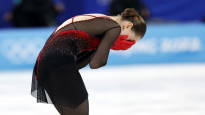Russian figure skater Kamila Valieva, who was in the eye of the storm during the Beijing Olympics, is waiting for the final verdict on her doping case. Now the case has already progressed to the CAS of the Court of Arbitration for Sport.
Russian figure skater Kamila Valieva the multi-step doping case has finally progressed to CAS, the Court of Arbitration for Sport. The World Anti-Doping Agency Wada and the International Skating Union ISU appealed the case to CAS, when the Russian anti-doping agency Rusada decided at the beginning of the year not to punish Valieva.
Valieva’s doping sample revealed the use of a heart medication banned in sports in December 2021, but the case did not have time to be processed before the Beijing Olympics.
With the permission of CAS, Valijeva was allowed to participate in the Beijing Games in February 2022. She won the gold medal in the team competition and finished fourth in women’s single skating. In the appeal, Wada demands a four-year ban from competition for Valieva and the annulment of the results from the date of taking the positive doping sample from December 25, 2021 onwards.
Rusada considers Valieva’s positive doping sample to be a loss. It considered that the athlete “did not make a mistake or show negligence”. According to Wada, Valieva has violated the doping rules of the sport.
– Wada has appealed to CAS for the sake of athletes’ justice and clean sport, Wada’s spokesperson commented on the case and assessed Rusada’s decision as a mistake.
The now 17-year-old Valieva gave a positive doping test at the age of 15.
Stretching irritates opponents
The three CAS judges are hearing Valieva’s case behind closed doors. The trio hears experts and witnesses via video link.
The protracted handling of Valieva’s case has irritated the opponents who lost to the Russians in the team competition at the Beijing Games. The Russian Olympic Committee team won the competition ahead of teams from the United States, Japan and Canada.
– The world’s anti-doping system has failed the athletes, those who skated on the US team Vincent Zhou criticized the situation on Monday.
Even though Valieva’s case was fresh, the WADA rules protect athletes under the age of 16. It was naturally difficult to follow the rule when it came to the Olympics and the figure skating star athlete.
The row was also fueled by the previous doping cases of Russian athletes, due to which Russian athletes competed in the Beijing Games without national symbols.
As a result of Valieva’s case, next year the ISU will raise the age limit for figure skating adult competitions from 15 to 17 years in order to protect the athletes’ “physical and mental health and emotional life”.
As an explanation, the remains of cutlery
Valieva gave a positive doping sample at the Russian championships on December 25, 2021. The sample revealed traces of trimetazidine, which is used for heart problems.
Valijeva has explained the problem with her grandfather’s medicines, the residues of which she would have gotten into her body from the cutlery.
CAS has previously considered two doping scandals caused by trimetazidine to be damages. The sports performance-enhancing effect of the substance has been assessed as questionable in several contexts, for example due to the substance’s many side effects such as nausea.
CAS has not announced when it will issue its decision on Valieva’s case, which began on Tuesday.
